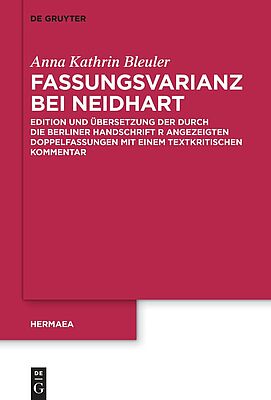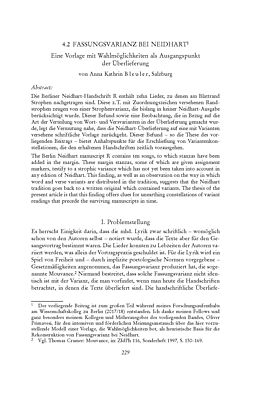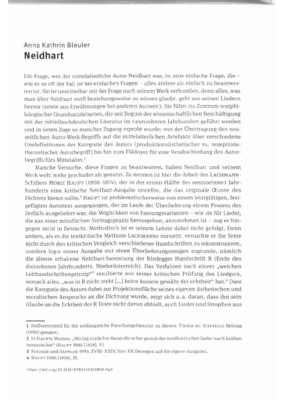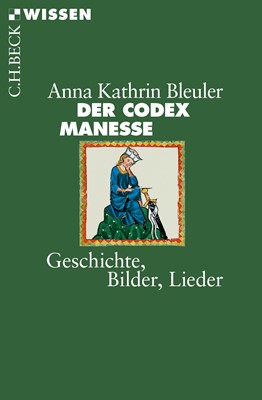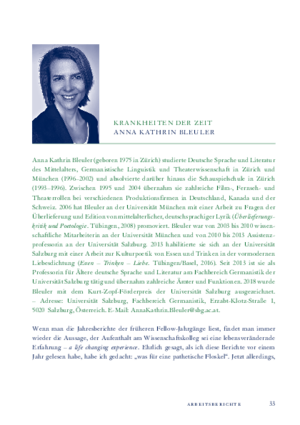
Anna Kathrin Bleuler, Dr. phil.
Assoziierte Professorin für Ältere deutsche Sprache und Literatur
University of Salzburg
Geboren 1975 in Zürich, Schweiz
Studium der Germanistik und Theaterwissenschaft an der Ludwig-Maximilians-Universität München und der Universität Zürich
Project
Minnesang jenseits nationalästhetischer Kanonbildung: Gruppierung, Beschreibung und Interpretation der Autorcorpora des Codex Manesse in Hinblick auf die historischen Sammlungszusammenhänge
Der Codex Manesse (Anfang 14. Jahrhundert, Zürich) ist mit 140 Autorcorpora und 138 Miniaturen die umfangreichste Sammlung mittelhochdeutscher Lyrik. Trotz seiner großen kulturhistorischen Bedeutung ist seine Erforschung defizitär. Zum einen bezieht sich ein Großteil der Lyrikforschung bis heute auf Editionen, die aufs 19. Jahrhundert zurückgehen und die nur einzelne Dichter aus dem Codex Manesse enthalten. Die Handschrift weist daher eine erhebliche Zahl an Werken auf, die bis heute weitgehend unerforscht, zum Teil sogar unediert sind. Zum anderen ist der Codex Manesse von einem Problem betroffen, das in den Philologien generell zu beobachten ist: Literaturwissenschaftliche, handschriftenkundliche und historiografische Forschung existieren weitgehend isoliert voneinander. Das hat zur Folge, dass neuere Erkenntnisse der Handschriftenkunde bei der inhaltlichen Beschäftigung mit den Texten bislang kaum berücksichtigt wurden. Die historiografische Forschung wiederum wird aufgrund der unsicheren Datenlage oftmals aus den Untersuchungen ausgeklammert. In der Summe hat man es einerseits mit erheblichen Forschungslücken zu tun, anderseits mit einer unüberschaubaren Fülle an Informationen, die oftmals isoliert voneinander vorliegen.Ziel des Vorhabens ist es, die aufs 19. Jahrhundert zurückgehenden Grenzziehungen und Ausgrenzungsmechanismen nationalästhetischer Kanonbildung, die bis heute indirekte Auswirkungen auf die Erforschung des Codex Manesse haben, zu überwinden. Hierfür wird eine Rekontextualisierung der Autorcorpora vorgenommen, indem sie auf ihre historischen Sammlungszusammenhänge zurückgeführt und von da ausgehend gruppiert, beschrieben und interpretiert werden. Hierfür müssen alle Autoren der Handschrift, die "Stars“ der Lyrikforschung ebenso wie die bislang weitgehend Vernachlässigten, einbezogen werden. Von dieser Herangehensweise verspreche ich mir nicht nur eine Profilbildung der bislang wenig erforschten Autoren des Codex Manesse, sondern auch neue Erkenntnisse zu den bereits gut erforschten. Methodisch erfordert dieses Vorgehen eine Aufarbeitung und Zusammenführung der Forschungsbefunde, die zum Codex Manesse aus den unterschiedlichen Bereichen der Literaturwissenschaft, Handschriftenkunde, Historiografie und Kunstgeschichte vorliegen.
Lektüreempfehlung
Balsamo, Jean und Anna Kathrin Bleuler, Hg. Les cours comme lieux de rencontre et d'elaboration des langues vernaculaires = Höfe als Laboratorien der Volkssprachigkeit zur Zeit 1480-1620. Genf: Droz, 2016 (= De lingua et linguis V).
Bleuler, Anna Kathrin. Essen - Trinken - Liebe: Kultursemiotische Untersuchung zur Poetik des Alimentären in Wolframs "Parzival“. Tübingen/Basel: Narr Francke Attempto, 2016 (Bibliotheca Germanica 62) [zugl. Habilitationsschrift, Salzburg, 2012].
-. Überlieferungskritik und Poetologie: Strukturierung und Beurteilung der Sommerlieder Neidharts auf der Basis des poetologischen Musters. Tübingen: Niemeyer, 2008 (MTU 136) [zugl. Diss., München, 2006].
Colloquium, 10.04.2018
How to Deal with the Variance of Medieval Texts: A Study of Middle High German Poetry
My project comes under the heading of textuality research. Of particular urgency is the specific question as to the constitutive conditions and the nature of texts in German-language literature from the ninth to sixteenth centuries. Texts from this period - whether they be poetic texts or those addressing more practical matters - were written down by hand at first on parchment and then later on paper. Their dissemination and transmission ensued by means of transcribed copies or by dint of memory. As opposed to the learned Latin literature of the time, the literate vernacular culture had no institutionalized standard of writing. That is why vernacular texts had a greater degree of variance than did the Latin ones. In scrutinizing a text that has been transmitted through two or more different handwritings, these textual witnesses more often than not will exhibit considerable deviations from one another. These deviations were largely owing to the fact that Germans of the time had no normative language at the highest level, i.e. on the literary plane, but instead had various (writing) dialects. The writing conventions that a certain scribe followed in copying a text had an impact on the text itself. The result was deviations in orthography, phonetics, grammar and syntax. Added to this were corruptions in transmission, editorial reworkings, modernization of the language, adaptations to changing cultural contexts, and simple errors in transcription.
Another reason for the variations was a certain text’s primary situation of use. Poetic texts were originally intended for oral performance. A poem’s author changed it for performance and produced various versions that found their way into circulation and led parallel lives in their transmission or might even blend one into the other.
It was in the nineteenth century that scholars began to preoccupy themselves with medieval German-language literature and proceeded to edit the texts on the basis of their modern author/oeuvre conceptions and transposed these notions to the texts. In other words they attempted to reconstruct the author’s original text or "archetypes" and tried to extirpate any deviations that might have occurred in the text’s transmission. There was no awareness of the problematic fact that the texts stemmed from certain very specific oral situations of use and that they might indeed have existed in a number of versions. Then in the mid-twentieth century the notion grew widespread that these methods of editing medieval vernacular writing were wrongheaded. Criticism was leveled at the efforts of editors to reconstruct an author’s original text. It was increasingly felt that such an undertaking was condemned to failure if for no other reason than that the texts were the product of a "living" tradition since they were in part orally transmitted and therefore any variations in a certain text could never be strictly accounted for. The result was an interdisciplinary discussion of methodology as it related to the editing of medieval vernacular texts. An era of New Philology was heralded and the category of "author" was dismissed when it came to the Middle Ages. The evaluative method increasingly gave way to a descriptive approach regarding textual transmission. Instead of reducing variance, today’s scholars ask themselves how they can present this variance in the most economical way.
In my lecture I will be critically examining these positions. Then I will present an edition of poems on which I am currently working and where I have returned to an evaluation of the transmission as earlier scholars had once done. But in contrast to them I don’t take some fixed-point original as my point of departure for tracing the text’s transmission but instead I surmise the existence of various (primary) versions of the text which I seek to identify through textual witnesses to that transmission. The object of my study is the poetry of Neidhart, active as a poet from 1220 to 1240 in Bavaria and Austria.
Publications from the Fellow Library
Bleuler, Anna Kathrin (Berlin, 2024)
Fassungsvarianz bei Neidhart : Edition und Übersetzung der durch die Berliner Handschrift R angezeigten Doppelfassungen mit einem textkritischen Kommentar Hermaea ; Neue Folge, Band 161
Bleuler, Anna Kathrin (Berlin, 2022)
Bleuler, Anna Kathrin (Berlin, 2022)
Lachmanns Erbe : Editionsmethoden in klassischer Philologie und germanistischer Mediävistik Beihefte zur Zeitschrift für deutsche Philologie ; 19
Bleuler, Anna Kathrin (Berlin, Boston, 2021)
Bleuler, Anna Kathrin (München, 2018)
Der Codex Manesse : Geschichte, Bilder, Lieder C.H. Beck Wissen ; 2882
Bleuler, Anna Kathrin (Tübingen, 2016)
Essen - Trinken - Liebe : kultursemiotische Untersuchungen zur Poetik des Alimentären in Wolframs "Parzival" Bibliotheca Germanica ; 62
Bleuler, Anna Kathrin (2013)
Körperdramen : Wolframs Inszenierung der Parzival-Figur anhand von Essen und Trinken
Bleuler, Anna Kathrin (2008)
Bleuler, Anna Kathrin (Tübingen, 2008)
Überlieferungskritik und Poetologie : Strukturierung und Beurteilung der Sommerliedüberlieferung Neidharts auf der Basis des poetologischen Musters Münchener Texte und Untersuchungen zur deutschen Literatur des Mittelalters ; 136
